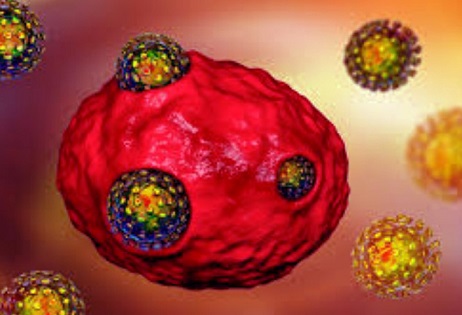Study finds that SARS-CoV-2 ORF3a protein triggers cell death by damaging lysosomes
Nikhil Prasad Fact checked by:Thailand Medical News Team Sep 17, 2024 1 year, 5 months, 1 week, 3 days, 7 hours, 12 minutes ago
Medical News: In a groundbreaking study conducted by researchers from the Indian Institute of Technology (IIT) Kanpur, it has been revealed that the SARS-CoV-2 ORF3a protein plays a pivotal role in inducing cellular stress and damaging lysosomes. Lysosomes are key cellular organelles responsible for breaking down waste materials and responding to cellular damage. The discovery highlights how the ORF3a protein triggers autophagy, a process in which the cell removes damaged components, and contributes to cell death. This
Medical News report delves into the findings and their potential implications for understanding COVID-19's impact on human cells.
 Study finds that SARS-CoV-2 ORF3a protein triggers cell death by damaging lysosomes
The Role of ORF3a in Lysosomal Damage
Study finds that SARS-CoV-2 ORF3a protein triggers cell death by damaging lysosomes
The Role of ORF3a in Lysosomal Damage
The SARS-CoV-2 virus, which causes COVID-19, contains multiple proteins that interact with host cell mechanisms. Among them, the ORF3a protein has been linked to causing damage to lysosomes, a crucial organelle in cellular waste management. Lysosomes are responsible for degrading cellular waste products, and their damage can lead to severe consequences, including cell death.
According to the researchers from IIT Kanpur, the ORF3a protein induces a process called Atg8ylation, which involves the recruitment of ATG8 proteins to damaged lysosomal membranes. Atg8ylation is crucial for the selective removal of damaged lysosomes, a process known as lysophagy. The researchers observed that cells expressing the ORF3a protein displayed increased localization of Galectin-3 (Gal3) to lysosomes, a marker of lysosomal damage. However, when autophagy machinery was impaired, cells could not effectively repair the lysosomal damage, leading to increased cell death.
Autophagy and Its Role in Cellular Defense
Autophagy, or the process of "self-eating," is a critical mechanism through which cells maintain their health. It involves the degradation of damaged or unwanted cellular components and plays a key role in defending against infections. The researchers highlighted that ORF3a interferes with this process by damaging lysosomes and preventing their repair. Despite the cell's efforts to remove the damaged organelles, the virus’s protein significantly hampers the autophagy process.
What makes this discovery particularly important is that it provides insight into the virus's strategy to evade the host's immune response. By targeting lysosomes, the virus can avoid degradation, ensuring its survival and replication within host cells. The study sheds light on how this specific mechanism by ORF3a could explain the prolonged and severe symptoms in some COVID-19 patients.
Inhibition of mTOR by ORF3a
The study also delved into the interaction between the ORF3a protein and mTOR, a key regulator of cell growth and metabolism. Normally, mTOR prevents autophagy by inhibiting the recruitment of essential autophagy proteins. However, the researchers found that the ORF3a protein inhibits mTOR activity, which allows for the initiat
ion of autophagy. Yet, even though autophagy is initiated, the damaged lysosomes cannot be repaired due to the virus’s interference, ultimately leading to cell death.
In this study, the researchers demonstrated that ORF3a induces nuclear translocation of transcription factor EB (TFEB), a master regulator of lysosomal biogenesis. However, this process is impaired in cells lacking autophagy proteins, further highlighting the importance of the autophagy machinery in protecting cells from ORF3a-induced damage.
ORF3a's Interaction with STX17 and Implications for Lysophagy
One of the key findings in this study is the interaction between ORF3a and Syntaxin 17 (STX17), a protein involved in autophagy and lysosomal function. The researchers found that STX17 interacts with ORF3a and is required for the process of Atg8ylation, which is essential for removing damaged lysosomes.
This discovery is significant because it highlights the unexpected role of STX17 in protecting cells from ORF3a-induced damage. By interacting with autophagy proteins such as STX17 and mammalian ATG8 (mATG8), ORF3a effectively disrupts the cell's ability to repair damaged lysosomes, leading to further cellular damage and eventual death. The study also found that cells lacking STX17 exhibited increased cell death when exposed to ORF3a, underscoring the importance of this protein in cellular defense mechanisms.
Key Findings and Potential Therapeutic Implications
The study presents several key findings
:
-Atg8ylation of Lysosomal Membranes: ORF3a induces Atg8ylation, a cellular response to lysosomal damage. This process is crucial for removing damaged lysosomes, but ORF3a disrupts this process, leading to cell death.
-Inhibition of mTOR: ORF3a inhibits mTOR activity, which normally suppresses autophagy. However, despite initiating autophagy, the cells are unable to repair damaged lysosomes, leading to cellular stress and death.
-Role of STX17: STX17 interacts with ORF3a and plays a critical role in protecting cells from lysosomal damage. Cells lacking STX17 show increased vulnerability to ORF3a-induced damage.
These findings have important implications for developing therapeutic strategies targeting SARS-CoV-2 proteins. By understanding how ORF3a induces lysosomal damage, researchers can explore potential treatments that could block this interaction and protect cells from the virus's destructive effects. Targeting the autophagy-lysosomal pathway may offer new avenues for treatment, particularly for severe and prolonged COVID-19 cases.
Conclusion: A New Understanding of SARS-CoV-2’s Impact
The findings from this study contribute to our growing understanding of how SARS-CoV-2 affects host cells. By targeting lysosomes and disrupting autophagy, the virus can evade the host’s immune system and cause prolonged cellular damage. The identification of key proteins like ORF3a and STX17 in this process opens up potential therapeutic targets for future COVID-19 treatments.
As the world continues to grapple with the long-term effects of COVID-19, understanding the molecular mechanisms behind the virus’s impact on cells is crucial.
The study findings were published on a preprint server and is currently being peer reviewed.
https://www.biorxiv.org/content/10.1101/2024.09.12.612614v1
For the latest COVID-19 News, keep on logging to Thailand
Medical News.
Read Also:
https://www.thailandmedical.news/news/covid-19-research-nih-scientists-discover-that-sars-cov-2-utilizes-lysosomes-to-exit-cells-and-not-normal-biosynthetic-secretory-pathways
https://www.thailandmedical.news/news/covid-19-news-sars-cov-2-orf7a-blocked-autophagy-flux-by-intervening-in-the-fusion-between-autophagosome-and-lysosome-to-promote-viral-infection
